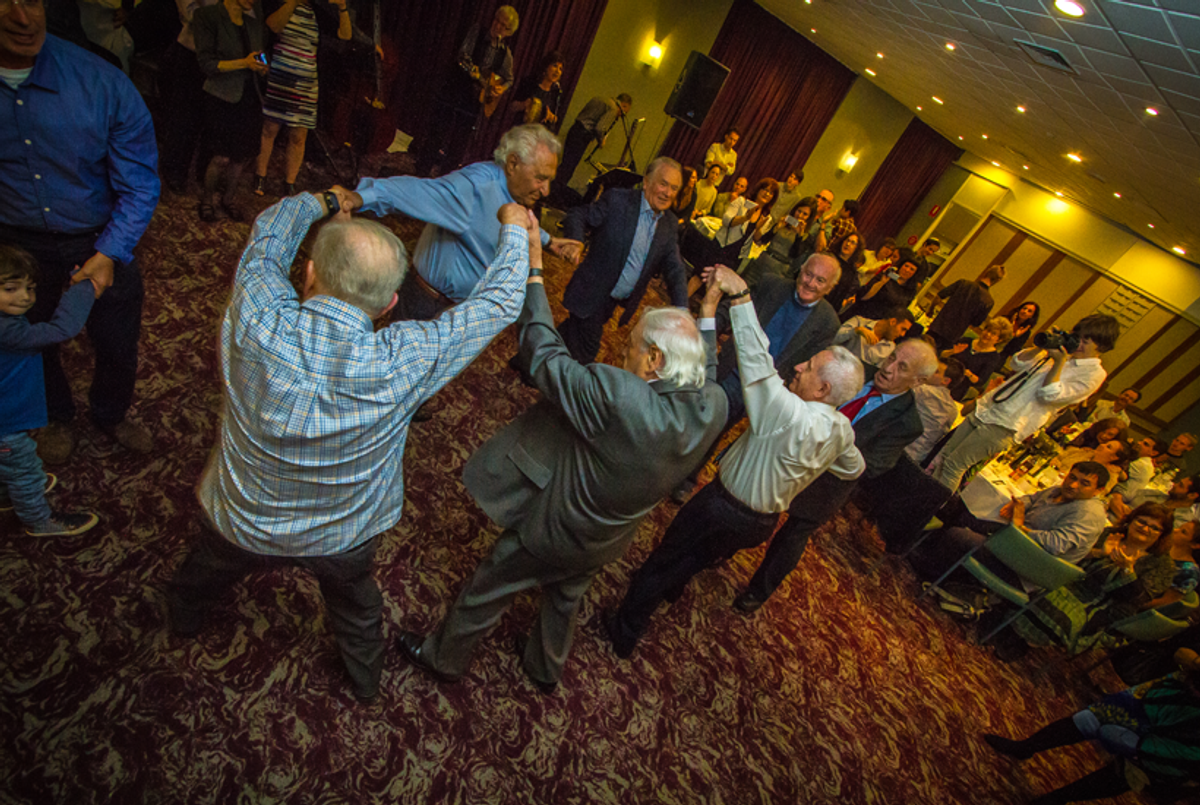
“We didn’t believe him; we didn’t know who he was. But then he started speaking Yiddish to us. And we knew we were free.”
On April 11, 1945, Szaja Chaskiel was liberated from Buchenwald concentration camp. He was one of 900 boys, aged 8 to 18, “born” that day, as he puts it. Uniquely bonded, they quickly became known as ‘The Buchenwald Boys.’ For 66 years a group of these survivors and their descendants in Melbourne, Australia, have celebrated this rebirth with the annual ‘Buchenwald Ball.’
This year, the night before the ball, which fell a few hours after the end of this Passover—precisely seventy years after their liberation—Szaja, now 86, retold the story of the exodus of the Buchenwald Boys from the Shoah, led by the Third Army’s Rabbi Herschel Schacter, the American liberator who addressed them in their mamaloshen. Assembled in Szaja’s living room were five other Boys who were surrounded by their descendants as well as those of the Boys who had since passed on.
Following liberation, roughly half were initially sent to France by the Red Cross and other agencies while the other group went to Switzerland. While some remained in France, many left Europe for New York, London, Toronto, Vancouver, Montreal, and to cities in Israel and in South America. A 65-strong band came to Australia, settling in Melbourne and Sydney; today, less than twenty are still alive, and four have died in the past year.
In the late 1940s the Boys seized their teenage years, dancing in the clubs of Paris. They learned how to dance the cha-cha and the jitterbug to charm the ladies, and how to party. Now old men in Melbourne, the Boys are still celebrating. In Szaja’s living room, the whiskey flowed freely, and an intimate dinner was served to the small number still well enough to be led into a late and rowdy evening by their livewire host.
The next day, ten of the Boys, along with their children and grandchildren—approximately 200 people in total—re-assembled for the 70th anniversary Buchenwald Ball, held at the Theodor Herzl Club in the suburb of Caulfield, Melbourne’s Jewish heartland. For the last two years the festivities have been coordinated by the second generation rather the long-standing Executive Committee, which is manned by the first. This year’s organizers include Szaja’s daughter Sandi Rapoport; Yossl Baker’s son Mark Baker and daughter-in-law Kerryn Baker; and Henry Salter’s daughter Tania Freeman.
“They get together and they drink and they sing,” said Szaja’s son Mark. “And they drink some more, and they sing some more.”
Here’s Jack Unikowski, 87, singing the Buchenwald Song, which was written by inmates Hermann Leopoldi and Fritz Löhner-Beda, and became something of an anthem for the Boys:
Oh Buchenwald ich kann dich nicht vergessen / Weil du mein Schicksal bist
Wer dich verlasst der kann es erst ermessen / Wie wunderbar die Freiheit ist.
Oh Buchenwald, I cannot forget you / You are my present fate
Those who’ll live to leave you / Will know how liberty is great.
Here, joy and tragedy are inextricable. Szaja requested a minute’s silence for the Boys’ families who did not survive the Holocaust. Afterwards, he declared: “Enjoy, and have a ball!”
The philanthropic agencies supporting these young men threw the first Buchenwald Ball in Melbourne in 1949, and it has been held, in various guises, every year since. In the beginning it was at once a celebration of liberation, and a Jewish singles event. With hot dance moves fresh from Paris, the Boys soon partnered off—some with local Australian Jewish girls, a few with fellow survivors, and many with British Jewish women brought in to help bolster romantic prospects. Dancing became a lifelong love of the Australian Buchenwald Boys.
Before the festivities begin the Boys gather for a yizkor service at the Buchenwald Memorial at Melbourne’s largest Jewish cemetery. On the morning of April 12, the night after the dinner at Szaja’s home, three generations of Buchenwalders spoke.
“This was the first April 11th without my Zaida,” said Melissa Weinberg, the granddaughter of Sam Michalowicz. “I know that it’s been a tough year for many of us here. And though it’s hard, my Zaida taught me to celebrate, and so that’s what we’ll do.”
These days, the Boys aren’t up to the cha-cha and the waltz, but they danced with joy to the strains of Melbourne’s Klezmania. “These guys danced through life,” said Mark Baker of the Boys, “and danced to the chuppah.”
☛ Click on the link below the main image to launch the slideshow. ☚
Andrew Harris is a writer and photographer based in Melbourne, who loves Jewish music, food and culture from around the world, and hopes one day to realize his childhood dream of becoming Sephardi. He has never tasted anything quite like galla. Follow him on Twitter here.
Previous: Visiting Buchenwald With My Grandfather
Andrew Harris is a writer and photographer based in Melbourne, who loves Jewish music, food and culture from around the world, and hopes one day to realize his childhood dream of becoming Sephardi. Follow him on Twitter here.